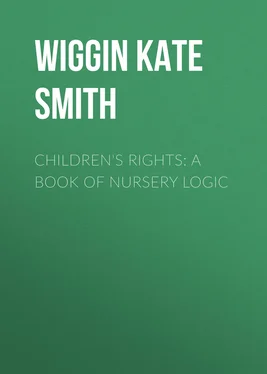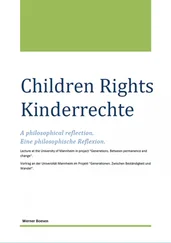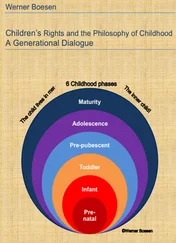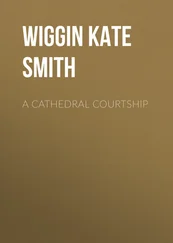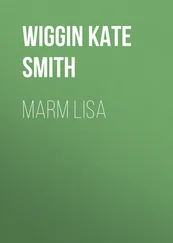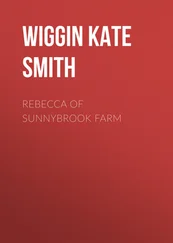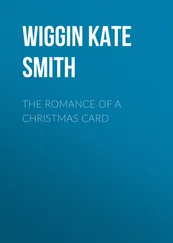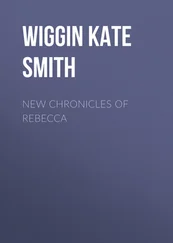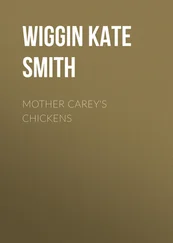Kate Wiggin - Children's Rights - A Book of Nursery Logic
Здесь есть возможность читать онлайн «Kate Wiggin - Children's Rights - A Book of Nursery Logic» — ознакомительный отрывок электронной книги совершенно бесплатно, а после прочтения отрывка купить полную версию. В некоторых случаях можно слушать аудио, скачать через торрент в формате fb2 и присутствует краткое содержание. Издательство: Иностранный паблик, Жанр: popular_business, upbringing_book, foreign_psychology, на английском языке. Описание произведения, (предисловие) а так же отзывы посетителей доступны на портале библиотеки ЛибКат.
- Название:Children's Rights: A Book of Nursery Logic
- Автор:
- Издательство:Иностранный паблик
- Жанр:
- Год:неизвестен
- ISBN:нет данных
- Рейтинг книги:5 / 5. Голосов: 1
-
Избранное:Добавить в избранное
- Отзывы:
-
Ваша оценка:
- 100
- 1
- 2
- 3
- 4
- 5
Children's Rights: A Book of Nursery Logic: краткое содержание, описание и аннотация
Предлагаем к чтению аннотацию, описание, краткое содержание или предисловие (зависит от того, что написал сам автор книги «Children's Rights: A Book of Nursery Logic»). Если вы не нашли необходимую информацию о книге — напишите в комментариях, мы постараемся отыскать её.
Children's Rights: A Book of Nursery Logic — читать онлайн ознакомительный отрывок
Ниже представлен текст книги, разбитый по страницам. Система сохранения места последней прочитанной страницы, позволяет с удобством читать онлайн бесплатно книгу «Children's Rights: A Book of Nursery Logic», без необходимости каждый раз заново искать на чём Вы остановились. Поставьте закладку, и сможете в любой момент перейти на страницу, на которой закончили чтение.
Интервал:
Закладка:
It was while he was looking on with delight at the plays of little children, their happy, busy plans and make-believes, their intense interest in outward nature, and in putting things together or taking them apart, that Froebel said to himself: "What if we could give the child that which is called education through his voluntary activities, and have him always as eager as he is at play?"
How well I remember, years ago, the first time I ever joined in a kindergarten game. I was beckoned to the charming circle, and not only one, but a dozen openings were made for me, and immediately, though I was a stranger, a little hand on either side was put into mine, with such friendly, trusting pressure that I felt quite at home. Then we began to sing of the spring-time, and I found myself a green tree waving its branches in the wind. I was frightened and self-conscious, but I did it, and nobody seemed to notice me; then I was a flower opening its petals in the sunshine, and presently, a swallow gathering straws for nest-building; then, carried away by the spirit of the kindergartner and her children, I fluttered my clumsy apologies for wings, and forgetting self, flew about with all the others, as happy as a bird. Soon I found that I, the stranger, had been chosen for the "mother swallow." It was to me, the girl of eighteen, like mounting a throne and being crowned. Four cunning curly heads cuddled under my wings for protection and slumber, and I saw that I was expected to stoop and brood them, which I did, with a feeling of tenderness and responsibility that I had never experienced in my life before. Then, when I followed my baby swallows back to their seats, I saw that the play had broken down every barrier between us, and that they clustered about me as confidingly as if we were old friends. I think I never before felt my own limitations so keenly, or desired so strongly to be fully worthy of a child's trust and love.
Kindergarten play takes the children where they love to be, into the world of "make-believe." In this lovely world the children are blacksmiths, carpenters, wheelwrights; birds, bees, butterflies; trees, flowers, sunbeams, rainbows; frogs, lambs, ponies,—anything they like. The play is so characteristic, so poetic, so profoundly touching in its simplicity and purity, so full of meaning, that it would inspire us with admiration and respect were it the only salient point of Froebel's educational idea. It endeavors to express the same idea in poetic words, harmonious melody and fitting motion, appealing thus to the thought, feeling, and activity of the child.
Physical impressions are at the beginning of life the only possible medium for awakening the child's sensibility. These impressions should therefore be regulated as systematically as possible, and not left to chance.
Froebel supplies the means for bringing about the result in a simple system of symbolic songs and games, appealing to the child's activities and sensibilities. These he argues, ought to contain the germ of all later instruction and thought; for physical and sensuous perceptions are the points of departure of all knowledge.
When the child imitates, he begins to understand. Let him imitate the airy flight of the bird, and he enters partially into bird life. Let the little girl personate the hen with her feathery brood of chickens, and her own maternal instinct is quickened, as she guards and guides the wayward motion of the little flock. Let the child play the carpenter, the wheelwright, the wood-sawyer, the farmer, and his intelligence is immediately awakened; he will see the force, the meaning, the power, and the need of labor. In short, let him mirror in his play all the different aspects of universal life, and his thought will begin to grasp their significance.
Thus kindergarten play may be defined as a "systematized sequence of experiences through which the child grows into self-knowledge, clear observation, and conscious perception of the whole circle of relationships," and the symbols of his play become at length the truth itself, bound fast and deep in heart knowledge, which is deeper and rarer than head knowledge, after all.
To the class occupied exclusively with material things, this phase of Froebel's idea may perhaps seem mystical. There is nothing mystical to children, however; all is real, for their visions have not been dispelled.
"Turn wheresoe'er I may,
By night or day,
The things which I have seen, I now can see no more."
As soon as the child begins to be conscious of his own activities and his power of regulating them, he desires to imitate the actions of his future life.
Nothing so delights the little girl as to play at housekeeping in her tiny mansion, sacred to the use of dolls. See her whimsical attention to dust and dirt, her tremendous wisdom in dispensing the work and ordering the duties of the household, her careful attention to the morals and manners of her rag-babies.
The boy, too, tries to share in the life of a man, to play at his father's work, to be a miniature carpenter, salesman, or what not. He rides his father's cane and calls it a horse, in the same way that the little girl wraps a shawl about a towel, and showers upon it the tenderest tokens of maternal affection. All these examples go to show that every conscious intellectual phase of the mind has a previous phase in which it was unconscious or merely symbolic.
To get at the spirit and inspiration of symbolic representation in song and game, it is necessary first of all to study Froebel's "Mutter und Kose-Lieder," perhaps the most strikingly original, instructive, serviceable book in the whole history of the practice of education. The significant remark quoted in Froebel's "Reminiscences" is this: "He who understands what I mean by these songs knows my inmost secret." You will find people who say the music in the book is poor, which is largely true, and that the versification is weak, which is often, not always, true, and is sometimes to be attributed to faulty translation; but the idea, the spirit, the continuity of the plan, are matchless, and critics who call it trifling or silly are those who have not the seeing eye nor the understanding heart. Froebel's wife said of it,—
"A superficial mind does not grasp it,
A gentle mind does not hate it,
A coarse mind makes fun of it,
A thoughtful mind alone tries to get at it."
"Froebel 2 2 Eleonore Heerwart.
considers it his duty to picture the home as it ought to be, not by writing a book of theories and of rules which are easily forgotten, but by accompanying a mother in her daily rounds through house, garden, and field, and by following her to workshop, market, and church. He does not represent a woman of fashion, but prefers one of humbler station, whom he clothes in the old German housewife style. It may be a small sphere she occupies, but there she is the centre, and she completely fills her place. She rejoices in the dignity of her position as educator of a human being whom she has to bring into harmony with God, nature, and man. She thinks nothing too trifling that concerns her child. She watches, clothes, feeds, and trains it in good habits, and when her darling is asleep, her prayers finish the day. She may not have read much about education, but her sympathy with the child suggests means of doing her duty. Love has made her inventive; she discovers means of amusement, for play; she talks and sings, sometimes in poetry and sometimes in prose. From mothers in his circle of relations and friends, Froebel has learned what a mother can do, and although he had no children of his own, his heart vibrated instinctively with the feelings of a mother's joy, hope, and fear. He did not care about the scorn of others, when he felt he must speak with an almost womanly heart to a mother. His own loss of a mother's tender care made him the more appreciate the importance of a mother's love in early infancy. The mother in his book makes use of all the impressions, influences, and agencies with which the child comes in contact: she protects from evil; she stimulates for good; she places the child in direct communication with nature, because she herself admires its beauties. She has a right feeling towards her neighbors, and to all those on whom she depends. A movement of arms and feet teaches her that the child feels its strength and wants to use it. She helps, she lifts, she teaches; and while playing with her baby's hands and feet she is never at a loss for a song or story.
Интервал:
Закладка:
Похожие книги на «Children's Rights: A Book of Nursery Logic»
Представляем Вашему вниманию похожие книги на «Children's Rights: A Book of Nursery Logic» списком для выбора. Мы отобрали схожую по названию и смыслу литературу в надежде предоставить читателям больше вариантов отыскать новые, интересные, ещё непрочитанные произведения.
Обсуждение, отзывы о книге «Children's Rights: A Book of Nursery Logic» и просто собственные мнения читателей. Оставьте ваши комментарии, напишите, что Вы думаете о произведении, его смысле или главных героях. Укажите что конкретно понравилось, а что нет, и почему Вы так считаете.
